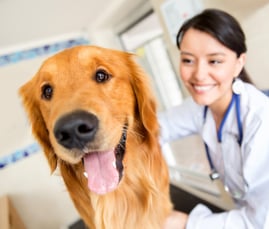An annual examination is an important part of total care for your pet. Your pet ages at a much faster rate than the average human. So, a year in a dog’s or a cat’s life is equivalent to about 3-8 years in a human life, depending on the breed.

Imagine yourself not visiting your family physician for that many years and imagine having an underlying disease that goes undetected for 3-8 years. Your pet cannot speak to you about his or her pain and discomfort. So, would you be observant enough to always be able to tell when your pet is sick? Even the most astute owners can rarely pick up on the subtle early signs of illness. In general, the earlier a disease is detected and treatment initiated, the better the potential outcome. Cats are even more enigmatic when it comes to showing signs of illness, making the annual examination even more valuable for this species.
An important part of the annual examination visit is a physical examination. Your family veterinarian will check your pet for any obvious external signs of dental disease, ear and eye infection, heart and lung disease, abdominal pain, musculoskeletal pain, skin infection, and anal gland problem etc. Diagnostic testing might be needed depending on the physical exam findings. An annual blood test for internal organ functions and blood cells might be needed especially if your pet is older. An annual exam will allow for early detection of potential life-threatening disease such as heart disease, liver disease, and kidney disease, just to name a few.
Your family veterinarian will also go over some history with you such as any clinical signs of vomiting, diarrhea, coughing and sneezing, activity level, appetite, water drinking and urination habit and any obvious signs of discomfort at home that might be a clue into your pet’s physical condition. It is important to have a list of your pet’s current medication, food, treats, and heartworm, flea and tick prevention to go over with your veterinarian during the annual visit.
Part of the annual examination includes your pet’s annual booster of vaccines. By law, every pet requires a rabies vaccination for public health reason. However, there are other vaccinations needed based on geographical location or risk due to your pet’s life style. The American Animal Hospital Association vaccination guidelines listed rabies and canine distemper/parvo virus combo as core vaccination for dogs and rabies and feline distemper combo as core vaccination for cats. However, if your dog is routinely subjected to exposure to other pets, it is recommended for your pet to receive canine Bordetella vaccine and recently, also canine influenza vaccine. If you live in tick states, your dog may also need a Lyme vaccination. Leptospirosis vaccination is also important if your pet frequents areas where wildlife visits. Your pet (and humans) can get infected with leptospirosis through contact of urine via a cut or skin wound, resulting in liver and kidney failure. For outdoor or indoor/outdoor cats, a feline leukemia vaccination is recommended due to increased risk of exposure.
For more information about pet vaccinations, contact your local Best Friends hospital.
Steve C. Chen, DVM




